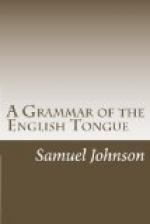to be found a great agreement between the letters
and the thing signified; and therefore the sounds
of the letters smaller, sharper, louder, closer,
softer, stronger, clearer, more obscure, and more
stridulous, do very often intimate the like effects
in the things signified.
Thus words that begin with str intimate the force and effect of the thing signified, as if probably derived from [Greek: stronnymi], or strenuous; as strong, strength, strew, strike, streak, stroke, stripe, strive, strife, struggle, strout, strut, stretch, strait, strict, streight, that is, narrow, distrain, stress, distress, string, strap, stream, streamer, strand, strip, stray, struggle, strange, stride, stradale.
St in like manner imply strength, but in a less degree, so much only as is sufficient to preserve what has been already communicated, rather than acquire any new degree; as if it were derived from the Latin sto; for example, stand, stay, that is, to remain, or to prop; staff, stay, that is, to oppose; stop, to stuff, stifle, to stay, that is, to stop; a stay, that is, an obstacle; stick, stut, stutter, stammer, stagger, stickle, stick, stake, a sharp, pale, and any thing deposited at play; stock, stem, sting, to sting, stink, stitch, stud, stuncheon, stub, stubble, to stub up, stump, whence stumble, stalk, to stalk, step, to stamp with the feet, whence to stamp, that is, to make an impression and a stamp; stow, to stow, to bestow, steward, or stoward; stead, steady, stedfast, stable, a stable, a stall, to stall, stool, stall, still, stall, stallage, stage, still, adjective, and still, adverb: stale, stout, sturdy, stead, stoat, stallion, stiff, stark-dead, to starve with hunger or cold; stone, steel, stern, stanch, to stanch blood, to stare, steep, steeple, stair, standard, a stated measure, stately. In all these, and perhaps some others, st denote something firm and fixed.
Thr imply a more violent degree
of motion, as throw, thrust, throng,
throb, through, threat, threaten,
thrall, throws.
Wr imply some sort of obliquity
or distortion, as wry, to wreathe,
wrest, wrestle, wring, wrong,
wrinch, wrench, wrangle, wrinkle, wrath,
wreak, wrack, wretch, wrist,
wrap.
Sw imply a silent agitation,
or a softer kind of lateral motion; as
sway, swag, to sway, swagger,
swerve, sweat, sweep, swill, swim, swing,
swift, sweet, switch, swinge.
Nor is there much difference of sm in smooth, smug, smile, smirk, smite; which signifies the same as to strike, but is a softer word; small, smell, smack, smother, smart, a smart blow properly signifies such a kind of stroke as with an originally silent motion, implied in sm, proceeds to a quick violence, denoted by ar suddenly ended, as is shown by t.
Cl denote a kind of adhesion or tenacity, as in cleave, clay, cling, climb, clamber, clammy, clasp, to clasp, to clip, to clinch, cloak, clog,




